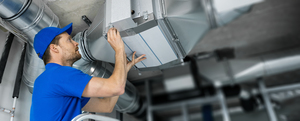

|
Edward Lowton
Editor |


|
| Home> | Premises management/maintenance | >Air pollution control equipment | >Using air conditioning in a sustainable way |
Using air conditioning in a sustainable way
07 December 2022
Not all businesses use their air conditioning efficiently, but there are a variety of simple solutions and small adjustments which could help reduce energy consumption and save money, explains David Lewis

WHILE THERE are a plethora of advantages to using air conditioning, not everyone utilises it in an efficient way, which translates to added costs and superfluous energy waste. This could easily be avoided by employing simple solutions and making small adjustments to our everyday routine at times when using air conditioning is absolutely necessary.
What many don’t realise is that there are ways air conditioning can used efficiently, and that even the smallest of changes can help save costs and contribute to environmental sustainability.
Choosing the right air conditioning systems
The efficiency of an air conditioner can have a significant impact on energy saving. By installing the right models, ones that are right in size but also suited to the environment they will be placed in, maximising energy efficiency becomes easier.
A unit that's too large might cool an environment faster, but it is inevitably inefficient when it comes to saving costs and energy. While a unit that’s too small might need to be kept on for longer, also resulting in wasted energy.
Choosing air conditioning alternatives that are HFC-free can have a significant impact when it comes to protecting the environment, particularly when considering that these greenhouse gases considerably contribute to global warming.
Faulty or poorly built air conditioning units can also leak or otherwise malfunction, damaging the environment by releasing climate-harming substances.
Choosing energy-efficient air conditioning units is a necessary step that won’t compromise their efficacy while having a positive impact on the planet, and it is one that is therefore worth taking.
Considering a building's design
Depending on how a building is designed and where it’s located, it might be more likely to be reached by direct sunlight. A top-floor office with large windows, for instance, might be a naturally warmer environment during summer months, making turning on air conditioning tempting.
However, simple solutions such as closing blinds or curtains can go a long way. Properly insulating doors and windows can similarly ensure that no warm air gets in and that no cold air escapes, consequently increasing air conditioning units' performance.
Changing our habits
Making even the smallest of adjustments to our routine when using air conditioning can make all the difference when it comes to saving energy. For instance, remembering to turn off air conditioning when leaving a building and closing all windows and doors can help save a significant amount of energy.
Using a fan or ceiling fan can reduce the need to keep air conditioning on a lower temperature, and help cold air circulate in a building without wasting too much energy.
On a particularly hot day, individuals may also feel tempted to use air conditioning on a lower setting, but when it comes to energy efficiency this is not advisable, particularly when considering that going even 1 °C lower could add up to an extra 10% of energy use.
Installing a smart thermostat is another efficient solution, offering the option to set schedules and therefore make sure air conditioners aren’t kept on longer than they should, for example at night.
The importance of upkeep
Regular maintenance is incredibly important when it comes to saving energy. Regularly cleaning air ducts and replacing potentially faulty parts can ensure that units continue to perform smoothly, helping save both energy and money.
It is estimated that replacing a dirty filter can decrease energy usage by 5-15%. It is therefore not difficult to see how failing to maintain air conditioning units can result in increased energy waste that can easily be avoided
David Lewis is HVACR engineer at adi Group
For more information:
Tel: 0121 451 2255


















